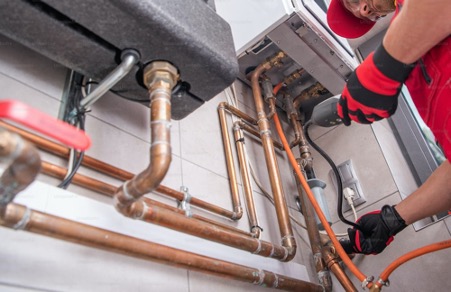Are Heat Pumps suitable for British homes?

When considering Heat Pumps, around 50% of the populace in the UK have limited knowledge about these systems, yet are always amazed by the environmental friendliness. They generate no CO2 emissions during usage and produce four times more heat than electricity consumed during the process.
Today we focus on the UK's generalised capacity for the roll out of Air Source Heat Pumps.
Do you have space?
Providing some background information, a typical outdoor heat pump unit measures around one metre in width, height, and half a metre in depth. The size of the heat pump unit depends on the size of the home it is being installed in. Additionally, there should be at least one metre of clearance from any boundary walls for installation purposes.
It's worth noting that heat pumps produce some level of noise while operating, so it's advisable to keep them away from bedroom windows. However, most modern heat pumps are designed to operate at low noise levels and are generally as quiet as a gas boiler.
In the UK, homes typically have combi boilers that generate hot water on demand. Heat pumps, on the other hand, store hot water in a cylinder until it is required. The size of the cylinder depends on the household's hot water usage, with some being as large as a standard fridge.
If your home currently has a combi boiler, you will need to find space to install a cylinder, which could mean sacrificing some storage space. Alternatively, if you already have a cylinder, you may need to replace it with a larger one to accommodate the heat pump. Fortunately, many heat pump installers offer a free assessment of your home as part of their service. It's worth shopping around to find one that offers this.
Could your home be better insulated?
Improving your home's insulation through loft and cavity wall insulation, draft proofing, and double-glazed windows can have a significant impact on the efficiency of your heat pump. The better insulated your home is, the less heat your heat pump will need to generate, resulting in lower electricity costs over time. Although investing in improved insulation incurs an initial cost, it's typically worth it in the long run due to energy savings.
Do your radiators need to be upgraded?
For those interested in the ins and outs of Heat Pumps, it's worth noting that the temperature of the water flowing into your radiators is referred to as the 'flow temperature'. The required flow temperature depends on factors such as radiator size, insulation, and desired home temperature.
Higher flow temperatures make heat pumps less efficient and more expensive to run, which is why installers may suggest replacing smaller radiators with larger ones to enable the heat pump to run at a lower flow temperature. Just like insulation upgrades, investing in radiator upgrades can result in significant cost savings in the long run. Therefore, if you're already planning on home renovations, it may be an opportune time to upgrade your existing heating system.
What's the cost to UK homeowners?
Heat pumps are becoming an increasingly popular option for homeowners looking to reduce their carbon footprint and cut their energy bills. But how much does it cost to install a heat pump, and is it worth it in the long run?
The average cost of a heat pump installation in a 'typical' home is £11,500. By comparison, a new gas boiler installation will typically cost £2,000-£4,000. It's important to note that, for the foreseeable future, a heat pump is likely to be more expensive to install than a boiler.
When it comes to running costs, recent data shows that a heat pump works out as only £48 more than gas over the course of a year. However, it beats an oil boiler on running cost by £88 per year and an LPG boiler by an impressive £650.
Is installing an ASHP really worth it in the UKs current climate?
So, while a heat pump may not actively save you much money today if you have a standard gas boiler, it's worth considering the long-term savings and potential future energy market reforms.
It's also worth noting that if you have solar panels (or are considering installing them), they would likely allow you to run your heat pump for free and significantly reduce your carbon emissions.
Ultimately, whether or not a heat pump is right for you and your home will depend on various factors. It's best to talk to a local heat pump installer who can provide you with tailored advice for your specific circumstances.
Although it may seem more complicated than sticking with a traditional boiler, with the ban on gas boiler sales in 2035 approaching quickly, it might be worth considering a heat pump as an alternative. One day soon, it could save you money and significantly reduce your carbon footprint for the future.